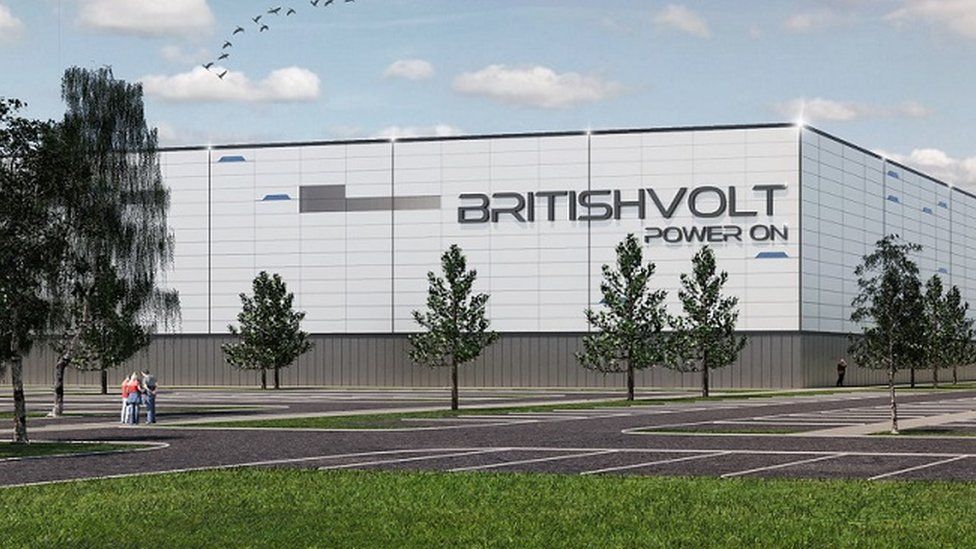BBC News 17 January 2023
UK battery start-up Britishvolt has collapsed into administration, with the majority of its 232 staff made redundant with immediate effect.
Employees were told the news at an all-staff meeting on Tuesday morning.
The firm had planned to build a giant factory to make electric car batteries in Blyth, Northumberland.
But Britishvolt struggled to turn a profit and ran out of money. Its board is believed to have decided on Monday that there were no viable bids to keep the company afloat.
Plans for the £3.8bn factory in Blyth were part of a long-term vision to boost UK manufacturing of electric vehicle batteries and create around 3,000 skilled jobs.
The project was championed by government ministers due to the area being one of the main so-called "red wall" seats to change hands from Labour to the Conservatives in the 2019 General Election.
The UK currently only has one Chinese-owned battery plant next to the Nissan factory in Sunderland, while 35 plants are planned or already under construction in the European Union.
Industry experts have said the UK will need several battery factories to support the future of UK car making as pure petrol and diesel engines are phased out over the next decade.
EY, who were appointed joint administrators, described the move as "disappointing", and said all impacted staff were being offered support.
Dan Hurd, joint administrator and partner at EY, said the firm had offered "a significant opportunity to create jobs and employment, as well as support the development of technology and infrastructure needed to help with the UK's energy transition".
Mr Hurd said the administrators would now explore options for a sale of the business and assets.
An existing shareholder added: "It's madness, I have been offering a variety of possible solutions. Falls on deaf ears. It appears, to me, that management wants the company to go into administration. A real shame."
Britishvolt had also planned to open a new battery development centre.
The ambitious, but financially troubled, start-up only narrowly avoided collapse at the end of last year after an emergency lifeline was extended by one of its investors, the commodity trading giant Glencore.
Last year, Britishvolt asked the government to advance £30m of a promised £100m in support, but was refused as the company had not hit agreed construction milestones to access the funds.
But both industry and government sources remain confident that this plant will eventually be built - whoever ends up owning it.
The Department for Business, Energy and Industrial Strategy (BEIS) said the government had "remained hopeful" that Britishvolt would find a suitable investor and was disappointed to hear it had not been possible".
It said it would work with the local authority in the area and potential investors to "ensure the best outcome for the site".
However, the Labour chairman of the Commons Business, Energy and Industrial Strategy Committee said the government needed to do more to support the UK's electric vehicle industry.
Darren Jones told BBC Radio 4's World At One programme: "There is a case to be made here in the UK for ministers and the government to be much more closely involved in delivering a successful battery manufacturing factory.
"If we want cars to continue to be made in the UK, we're going to have to build electric vehicle batteries here as well. So ministers needs to roll up their sleeves, not just write cheques."
The founders of Britishvolt were trying to create a £4bn facility, from scratch, without the backing of a major manufacturer.
What they did have was a vision which they hoped could surf a wave of political support - and attract the necessary funding.
They looked first for a location in Wales, before settling on Cambois, in the Blyth Valley.
The site, formerly a power station, was good. It had a deep water port, good transport links and access to plentiful power. It also happened to be in a "red wall" constituency captured by the Conservatives in 2019.
But political support wasn't enough. Delays to construction meant £100m of public funding never materialised. With costs rising and no firm orders, the money ran out.
The question is, what happens next? Speak to pretty much anyone in the motor industry, and they'll tell you that without gigafactories, the long-term future for UK manufacturing looks bleak.
So the plant itself could still become a reality. But for that to happen significant investment will be needed.
And any potential buyer will know that their chances of success will be much greater if they can get an established manufacturer on board.
'Very bad news'
Jim Holder, editorial director at What Car?, said that Britishvolt's factory would have taken years to build, "yet the truth is we need at least five such facilities by the turn of the decade to remain a competitive country to build electric cars in".
He warned it was "very bad news for the whole industry", adding: "The only positive will come if it spurs government into action to secure a partnership between itself, the industry and battery manufacturers that can succeed into the long-term."
Friends of the Earth described the collapse as "yet another blow to building the clean, modern future we urgently need".
There was also disappointment from people who live and work where Britishvolt's plant was supposed to be built.
Michelle Charlton, who runs Cafe One in the village of Cambois, said the news was "really disappointing".
"There isn't any real industry for the young ones coming through, so they could've done with it yes. It would've been a real benefit to the area," she told the BBC.



